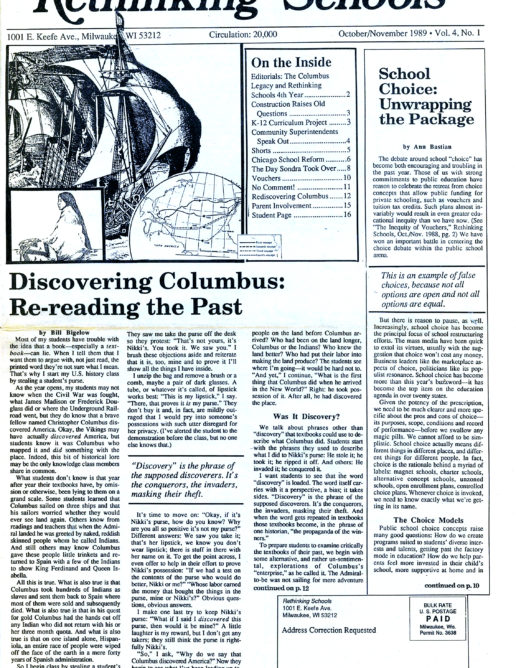Columbus’s Lingering Legacy: 500 Years is Enough
In the 1970s an Ojibway teacher flew to Italy and upon his arrival announced, “I discover and claim this land in the name of American Indians.” His action, which went largely unreported in the North American press, was intended to demonstrate the absurdity of Christopher Columbus’s similar claim of October 12, 1492.
Most people believe that Columbus “discovered” the Americas. Popular folk “wisdom” and most social studies textbooks portray his actions as humane and heroic. These perceptions, which arc based more on myth than reality, will probably become even more popular in the next few years as the quincentennial anniversary of Columbus’s first voyage approaches.
In 1984 President Reagan gave $87 million to the U.S. Christopher Columbus Quincentenary Jubilee Commission. This commission, headed by Miami real estate developer, John Goudie, works closely with commissions from around the world and is planning or has endorsed a wide range of activities including a Grand Regatta of tall ships for New York, Boston and San Francisco; an international floral exposition in Columbus’s honor in Columbus, Ohio; a map exposition coordinated by the University of Wisconsin— Milwaukee; and dozens of other exhibits and conferences. Republican Congressman Jim Kolbe of Arizona has introduced legislation which would replace the Susan B. Anthony coin with a goldcolored, better designed dollar coin featuring the face of Columbus.
These preparations for the 500th anniversary celebration are taking place in an atmosphere of increasing racial polarization. Violent attacks on people of color appear to be increasing, large scale protests against Native peoples’ treaty rights are common, the federal government has attempted to reverse gains won by the civil rights and women’s movements, and mainstream educators talk of “cultural literacy” as if it meant European culture. In such a climate it is likely that the main perspective of the quincentennial commemoration will be a championing of Euro-centric ideas and a continued distortion of history.
We believe, however, that a different kind of commemoration is in order. With-out negating the courage of the early explorers, we think the truth should be told. We think it is time to reinterpret the past. We should challenge the mainstream viewpoint that holds that history in the Americas began with Columbus and that he and others like him “^civilized” these “primitive” continents.
Many of the early European colonialists, starting with Columbus, came to North and South America and committed acts of savagery comparable only with the horrors of the African slave trade and the Holocaust. The largest cities of the world at that time—Tenochtitlan and Cuzco— were razed and pillaged. All the libraries in the advanced Mayan society were burned. Millions were murdered, raped or enslaved, and genocide was practiced against various Native and African peoples.
In the next few years there undoubtedly will be an onslaught of articles, children’s books, TV specials, postage stamps, conferences and pronouncements by government officials about the greatness of Columbus and his deeds. Instead of just accepting or trying to ignore such “official” versions of Columbus’s “discovery,” people and the media should take a more critical look at Columbus’s role in history.
Educators and concerned citizens could collaborate with Native American organizations on local, national and international levels in the development of curriculum, books, dramas, songs and public events which highlight not only the truth about the past, but an approach to helping people reflect upon the effects this history continues to have on millions of people today. For example, students could critically examine how Columbus’s role is portrayed in history books in activities described in Bill Bigelow’s “Discovering Columbus: Re-reading the Past” in this issue. Teachers can find an accurate portrayal of Columbus’s voyages in Howard Zinn’s A People’s History of the United States (Harper & Row, 1980).
The official anniversary activities provide, a unique opportunity for educators and parents to counter racism and Eurocentrism which were the ideological foundations of colonialism, slavery, and the deaths of millions of Native American and African peoples. It also provides the opportunity for people around the country to work together on projects that could make a significant contribution to the development of multi-cultural, anti-racist and critical educational practices in our country.
We encourage you to actively rethink Columbus.
For more information about efforts around the nation which are attempting to take a different approach to the Columbus 500th anniversary write to Philip Tajitsu Nash, CUNY Law School, Flushing, N.Y. 11367 or call 718-575-4319.

